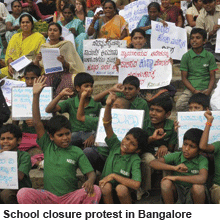A week-long (July 16-22) strike called by the Karnataka Unaided Sch- ools Management Association (KUSMA), which boasts a membership of 1,800 private unaided schools, to protest the “clumsy” implementation of the Right to Education Act (RTE), 2009 by the state government, received a lukewarm response. Only a handful of private unaided school managements responded to KUSMA’s strike call and shut down their institutions on July 16, with all of them reopening three days later following protests by parents and students. This unexpectedly tepid response forced KUSMA top brass to “defer” the protest.
 In a press statement dated July 18, KUSMA secretary A. Mariyappa conceded the association had failed “to secure appropriate response to its planned protest between July 16 and 22” and blamed “vested interests”. “A sum of Rs.2,400 crore is available in the state for misuse and corruption in the name of the RTE Act. It is these vested interests that are responsible for sabotaging KUSMA’s protest,” says Mariyappa. However, he adds that KUSMA will continue its protest by “convening a satyagraha calling its 1,800 member schools and parents to protest the government’s failure to answer the 11 questions we have publicly posed”.
In a press statement dated July 18, KUSMA secretary A. Mariyappa conceded the association had failed “to secure appropriate response to its planned protest between July 16 and 22” and blamed “vested interests”. “A sum of Rs.2,400 crore is available in the state for misuse and corruption in the name of the RTE Act. It is these vested interests that are responsible for sabotaging KUSMA’s protest,” says Mariyappa. However, he adds that KUSMA will continue its protest by “convening a satyagraha calling its 1,800 member schools and parents to protest the government’s failure to answer the 11 questions we have publicly posed”.
The main demand of KUSMA, whose founder-president G.S. Sharma resigned on July 17 following public outrage over “derogatory remarks” he made to a local television channel about the 25 percent poor neighbourhood children admitted under the RTE quota, is that the state government should clearly define minority schools which are exempted from s. 12 (1) (c) of the RTE Act which makes it mandatory for all unaided schools to admit 25 percent of children in class I from among poor and socially disadvantaged children in their neigh-bourhood. In its majority (2-1) verdict in Society for Unaided Private Schools of Rajasthan vs. Union of India delivered on April 12, the apex court exempted unaided minority (and boarding) schools from the ambit of s.12 (1) (c).
On July 7, the state government belatedly defined primaries and upper primaries with “more than 75 percent of students belonging to the minority community (or language)” as minority institutions. But KUSMA represent-atives say this definition is inadequate to properly implement the RTE Act in the state. “The state government still has not answered a lot of questions about how to define religious/linguistic minorities. Is a Tulu speaking student of a linguistic minority? Is a converted Christian or Buddhist of a religious minority? What documents or proof should a Muslim or a Christian school prom-oter produce to prove her case? Who is the authority to grant such certificates? We have posed 11 such questions to the state government. Until such time as the state government answers these questions citing precise Acts, secti-ons and rules, we will continue our protest,” says Mariyappa.
KUSMA leaders also fear a rush for minority status, which exempts schools from filling 25 percent of classes I-VIII capacity with poor children in their neighbourhoods under s.12 (1) (c), will open the floodgates of corruption within the education ministry whose officials are infamous for shakedowns and extortion. There’s also considerable confusion over the proposed Rs.11,848 per RTE quota student per year to be reimbursed to private unaided school managements by the state government.
Even as the state government — beset with a leadership crisis following the ouster of chief minister B.S. Yeddyurappa from office in July last year on corruption charges — scrambles to clear the air about minority classifications, fee reimbursements and other ambiguous provisions of the ill-drafted RTE Act, the KUSMA protest has shown that for harassed manage-ments of private unaided schools, shutting down their institutions is very much an option. Moreover, KUSMA’s dramatic protest has also helped unite various private school associations in the state including the Karnataka State Private Schools Management Federation and Managements of Independent CBSE Schools of Karnataka against the RTE Act. A new association — the National Foundation for Promotion and Protection of Private Education — is also scheduled to be formally launched on August 16 to protect the interests of India’s private schools (see cover story).
With a steadily growing number of private schools raising banners of revolt against the RTE Act and its implementation by state governments, and a petition already filed in the Supreme Court praying for review of its April 12 judgement, the battle lines are clearly drawn. And as the KUSMA protest has shown, private schools in Karnataka which host 32 percent of the state’s 8.4 million primary school children, won’t be the pushovers they were in the past.
Summiya Yasmeen (Bangalore)